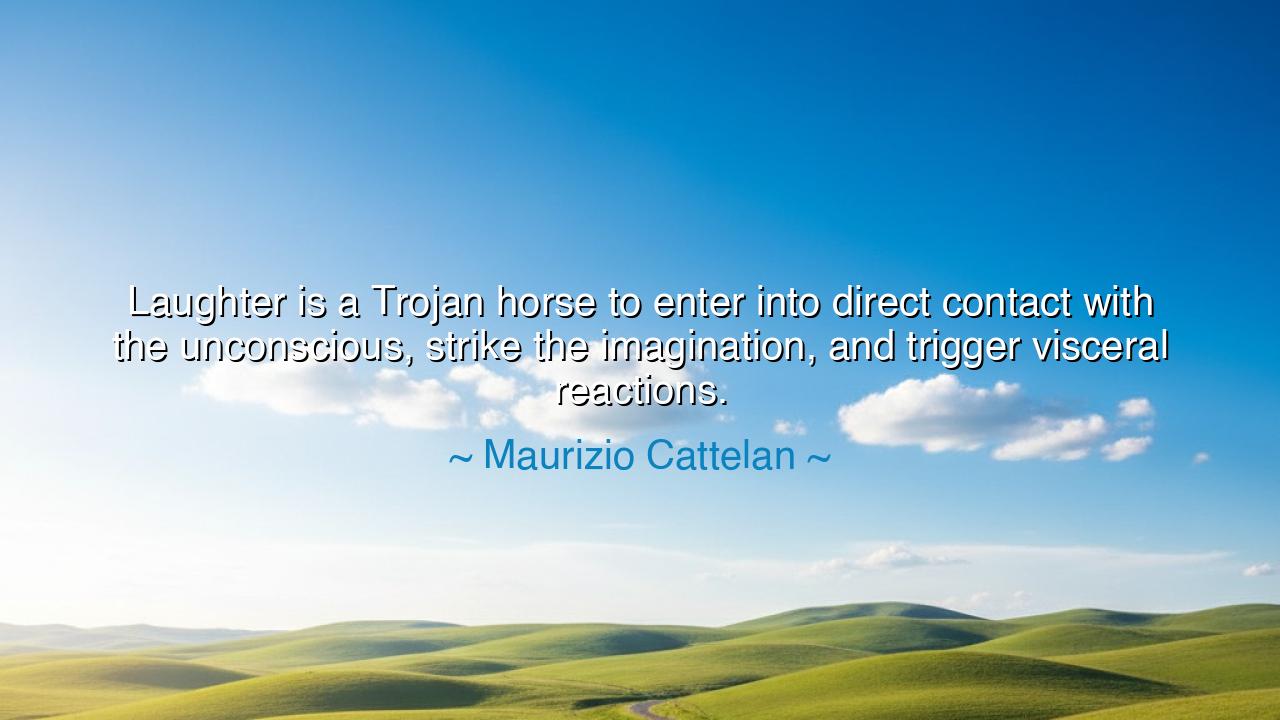
Laughter is a Trojan horse to enter into direct contact with the
Laughter is a Trojan horse to enter into direct contact with the unconscious, strike the imagination, and trigger visceral reactions.






“Laughter is a Trojan horse to enter into direct contact with the unconscious, strike the imagination, and trigger visceral reactions,” said Maurizio Cattelan, the Italian artist known for his bold, ironic, and often shocking works that blur the line between humor and critique. In this striking reflection, Cattelan reveals the ancient and psychological power of laughter — not as a mere escape, but as a weapon of truth, a subtle invader that slips past our defenses to awaken what lies hidden within. His words echo the wisdom of the philosophers and dramatists of old, who knew that humor, like myth, could pierce the heart more deeply than reason ever could.
In calling laughter a Trojan horse, Cattelan invokes the legend of the Greeks, who, after long years of fruitless siege, conquered Troy not through brute force but through deception of form — hiding soldiers within a gift of beauty. In the same way, laughter disguises its power beneath playfulness. It enters the mind softly, joyfully, and then strikes — awakening awareness, exposing hypocrisy, unsettling the comfortable. Laughter, in Cattelan’s view, is a vehicle for truth disguised as jest. It bypasses intellect and speaks directly to the unconscious, where emotion and imagination dwell. What argument cannot persuade, laughter can reveal.
Throughout history, the wisest teachers and the boldest reformers have understood this secret. Socrates mocked ignorance with irony; Voltaire shattered dogma with wit; Charlie Chaplin confronted tyranny with comedy. Each, in his own way, wielded laughter not as entertainment, but as enlightenment. When Chaplin made The Great Dictator, the world was at war, and the shadow of fascism loomed over humanity. Yet through humor — through a fool’s imitation of a tyrant — he revealed the absurdity of power and the vulnerability of evil. The audience laughed, but their laughter carried a deeper tremor: the recognition of truth. In that moment, laughter became rebellion; the Trojan horse had entered the gates.
Cattelan’s own art mirrors this ancient method. His works, often humorous or absurd, conceal deep critique. In Comedian — the infamous banana taped to a wall — the laughter of the crowd was itself part of the message. Beneath the surface joke lay a profound statement about value, art, and the absurdity of modern consumption. The laughter he provoked was not escape, but confrontation; it forced viewers to question their own complicity, their beliefs, their hunger for meaning in a world that commodifies even absurdity. Here, laughter became not relief, but revelation — the key that unlocked the door to the subconscious, where truth hides beneath layers of denial.
But Cattelan also speaks to a more intimate truth: that laughter connects us to our deepest humanity. When we laugh, the masks we wear — pride, intellect, pretense — fall away. We are momentarily unguarded, exposed, visceral. In that raw openness, the imagination is free to see without fear. Thus, laughter does not merely amuse; it transforms. It disarms the mind and liberates the spirit. It allows us to face the unbearable — suffering, absurdity, mortality — and to transmute it into meaning. In laughter, the soul remembers its own resilience.
There is a sacred paradox here: that which is light carries the heaviest truth. For laughter, like myth or poetry, operates in symbols. It reaches the unconscious, where words alone cannot go. When we laugh, we momentarily surrender control; our reason falters, our body shakes, our breath breaks — and in that break, revelation enters. The imagination is struck, the emotions stirred, the truth awakened. That is why tyrants fear laughter: because it unmasks the false gods of fear and authority. No empire, no ideology, no ego can withstand the laughter that knows its own freedom.
So let this be the teaching: use laughter not to escape, but to awaken. Let humor become a tool of compassion, of courage, and of creation. Laugh at folly — especially your own — for in that laughter lies liberation. Do not despise the jester, for his jest carries the wisdom the solemn often miss. Seek in laughter not mere pleasure, but the spark of imagination that touches the soul. For as Maurizio Cattelan reminds us, laughter is not weakness — it is art, intelligence, and rebellion. It is the ancient Trojan horse that carries truth into the heart, disguised as joy.
And remember, O listener: to laugh is to remember that you are alive, that even in the face of absurdity, the human spirit remains unconquered. Let your laughter be both song and sword — gentle enough to heal, yet sharp enough to reveal. For when laughter enters the gates of the heart, it brings with it the wisdom of freedom.






AAdministratorAdministrator
Welcome, honored guests. Please leave a comment, we will respond soon